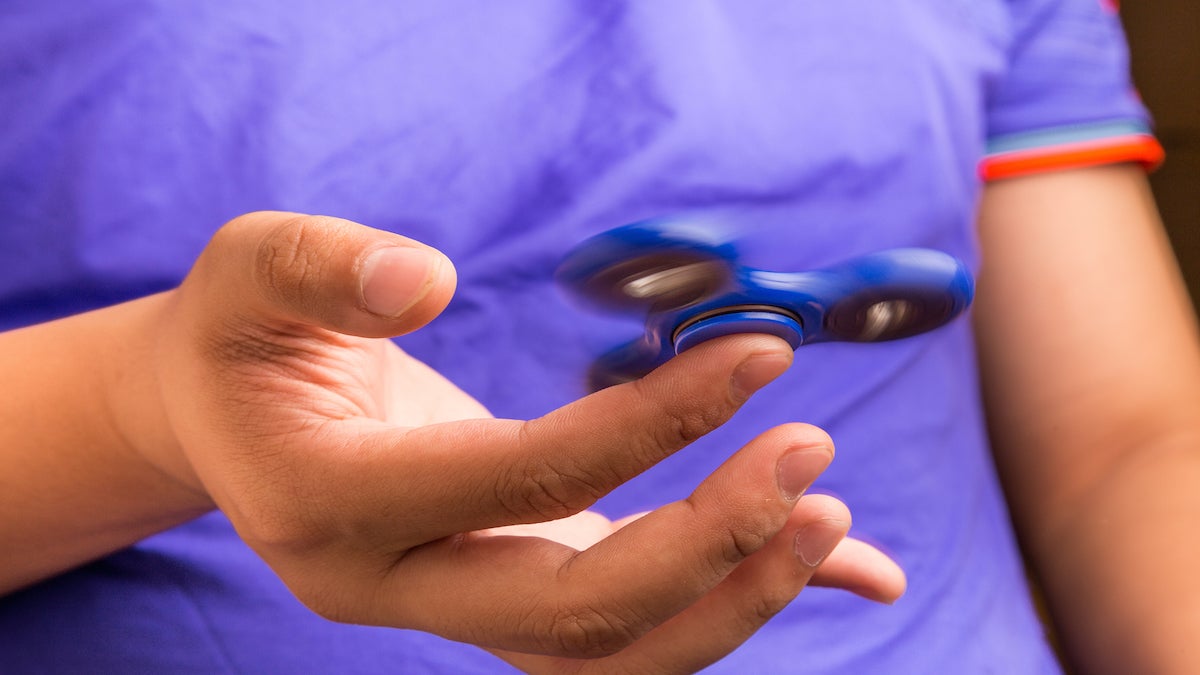Takeaways for parents from the Fidget Spinner phenomenon

If you have an elementary age kid, tween or teen, you know all about the fidget spinner craze.
For the last couple of months, this small bearing device made of three blades that fit in your fingers and can spin for a minute or two has captivated kids across the country. It’s marketed as a toy that can help with attention and focus—and yet, many schools are banning the spinners because they’ve found just the opposite to be true.
Beyond the hype, the fidget spinner craze can be an opportunity for parents to better understand about their children’s learning, attention and sensory processing issues. Whether your child has a formal diagnosis of ADD/ADHD, autism, anxiety and/or sensory processing issues or struggles from time to time with focus and attention to homework, it’s helpful to know about the connection between movement, learning and sensory regulation.
While the fidget spinners may seem like a craze that came out of nowhere, the idea of using fidget tools like stress balls or sensory putty to help children with learning, behavior or sensory integration issues isn’t new. Kids (and adults) who have ADHD, sensory processing issues, and/or may be diagnosed on the autism spectrum may need some kind of movement to regulate their sensory systems so that they can focus on what’s happening in the classroom. Some kids can be more attentive when they have small hand movement going on, like squeezing putty, while engaging in a task.
As adults, we have the freedom to engage in different kinds of small movements through our work day that help us to stay focused and alert; we don’t think about actions like sucking on an iced coffee through a straw, chewing gum, tapping our pens, doodling during a meeting, as regulating our sensory systems—but all of these behaviors are giving us outlets for our energy. Many educators have observed that it’s not surprising that the fidget spinners seemed to spike in popularity this spring, right when many kids had to manage their anxiety around standardized testing and focus for long stretches of time.
Jaime Bassman, a Philadelphia-based pediatric occupational therapist encourages adults to observe what’s happening when a young person uses a fidget spinner. “Look at the child’s response and note if it’s helping them to focus or causing them to become even more dysregulated,” she says. “I can’t support a wholesale ban on them because it may help certain children, but I can also say that multiple children using fidgets at once when they don’t need them can dysregulate everyone around them.”
Dr. Nicole Beurkens, a behavior specialist working with young people on the autism spectrum, says the critical question is: Is the student able to get their work done and focus? If the spinner is a distraction and not helpful in focus, she doesn’t recommend a ban on them, but instead urges that it be used as a reward to be played with after work is done or for recess/break time.
The fidget spinner opens the opportunity to have a conversation with your child about what helps him/her to focus. My 11-year-old daughter loves to play with her spinners but acknowledges that they are distracting. She has found that the fidget cube—which fits in her hand and can be held quietly while she does her homework—is much more helpful. My 14-year-old son, who is on the autism spectrum and has sensory processing challenges, shows little interest in the spinner.
If you suspect that your child is struggling with attention or sensory processing issues, you may want to do an evaluation with an occupational therapist (who work on sensory integration) and/or ask your school to do a psycho-educational evaluation. For any child, fidget toys may be one kind of accommodation that help with learning, but children that are craving their input may need other supports.
I’d love to hear your experiences with your kids and the fidget spinners below!
WHYY is your source for fact-based, in-depth journalism and information. As a nonprofit organization, we rely on financial support from readers like you. Please give today.

